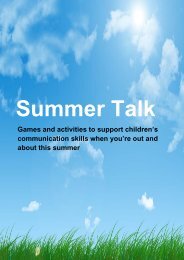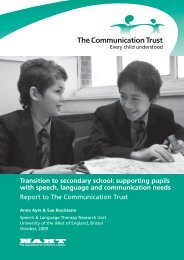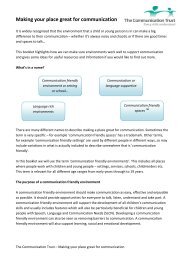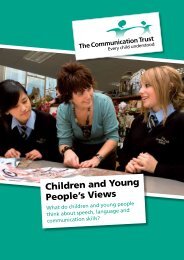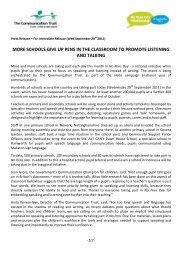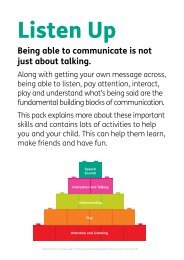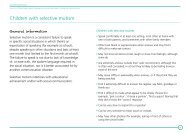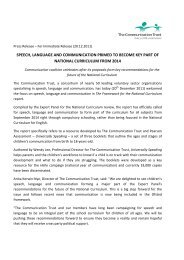Communicating Phonics - The Communication Trust
Communicating Phonics - The Communication Trust
Communicating Phonics - The Communication Trust
You also want an ePaper? Increase the reach of your titles
YUMPU automatically turns print PDFs into web optimized ePapers that Google loves.
<strong>Communicating</strong> <strong>Phonics</strong>Section 2 > General principlesInterpreting children’s responses to the check<strong>The</strong> phonics check aims to see how effectively children areusing their phonic skills to decode words.<strong>The</strong> responses of some children with SLCN on the check mayindeed show how effectively they are using their phonic skillsin this way. However, responses may in fact be more of areflection of their SLCN than their decoding or phonic skills.As a general principle, it’s essential that a child’s SLCN are fullyconsidered when interpreting their responses to the check.Details of how to interpret responses in relation to specifictypes of SLCN are included in section 4, but this table outlinessome general possible interpretations.ResponseAccurateresponseNo response ordelayed responseInaccurateresponseAccurate responseto real words– inaccurateresponse to nonwordsPossible interpretationEffective use of phonic skillsHowever, it would be important to see whetherchildren are also skilled in reading comprehensionDifficulties with phonic skillsAnd/or one or more of the following issues:• Difficulties understanding instructions• Limited confidence or anxiety• SLCN which prevent access to the check• Not developmentally ready to respond• Difficulties processing• Speech difficultiesDifficulties with phonic skillsAnd/or one or more of the issues mentioned aboveSpeech difficulties – children may have difficultieswith their phonic skills alongside their speech needs;however some children will be able to decodeeffectively but their speech may make this difficultto evaluate• Difficulties in producing nonsense words• Difficulties understanding the concept of ‘made-up’words• Limited vocabulary making decisions about real ornon-words difficult• Some children, although they can decodeeffectively, will turn the non word into a real wordas this would make more sense09




